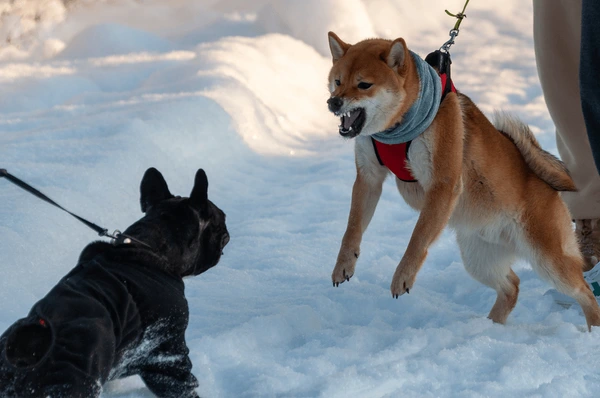So you’ve seen the pictures. That fox-like face, those alert little ears, the cheeky grin. You’re thinking about bringing home a Shiba Inu. Or maybe you already have one and are sitting on the couch googling “why is my Shiba acting like a spicy gremlin?”
Trust me, you’re not alone. Shibas have a reputation, some deserved, some totally blown out of proportion. The question a lot of people ask is: are Shiba Inus aggressive? And the answer is… kind of layered.

Let’s walk through it, dog lover to dog lover.
The Shiba Reputation: Where It Comes From
Shibas aren’t your average people-pleasing, tail-wagging, cuddle-on-command pups. They’re independent thinkers. Like, really independent. Picture a cat trapped in a dog’s body.
This doesn’t mean they’re aggressive, it just means they don’t always care what you want. They’ll happily ignore you, protest loudly when they disagree, and sometimes act like they’re the boss of the household.
But let’s clear something up right away: being independent or stubborn is not the same thing as being aggressive.
A Real-Life Shiba Moment (Because They’re a Whole Mood)
A friend of mine once tried to give her Shiba a bath. Simple task, right? That little dog let out a scream so wild, she thought the neighbors were going to call the police.
That’s the famous “Shiba scream.” Not pain. Not aggression. Just high-drama protest. Some dogs bark. Shibas stage full-blown Oscar-worthy performances.
That kind of moment can make a new owner panic. But it’s not aggression. It’s just the Shiba way of saying, “I hate this and you will hear about it.”
Understanding Real Aggression vs Shiba Sass
Aggression means there’s intent to harm, biting, lunging, or snapping with warning. Shibas, like many dogs, can show aggression. But so can Labs, Poodles, and Chihuahuas.
The key is understanding why it’s happening.
Some Shibas resource guard. They growl when you reach for their food bowl or touch their toys. Some are reactive toward other dogs, especially same-sex aggression with other dominant breeds.
Others show fear-based behavior, growling or snapping when they feel cornered or overhandled, especially by strangers or children who don’t read their signals.
Is this unique to Shibas? Nope. But it can feel more intense because they’re not as naturally people-focused as other breeds.
Factors That Can Lead to Aggression
Shibas are naturally alert and a little wary. It’s part of what makes them good watchdogs. But without proper socialization, that wariness can morph into full-on fear-based aggression.
Lack of early exposure to people, dogs, different sounds, surfaces, and experiences? That can absolutely make a Shiba more prone to snapping or guarding behaviors later.
Then there’s inconsistent training. If one day they’re allowed to guard the couch and the next they’re scolded for it, they’ll get confused and frustrated.
Genetics play a role, too. If you’re getting a Shiba from a breeder, ask about the parents’ temperaments. If you’re adopting, be open to a learning curve.
And let’s not forget health issues. Pain, thyroid problems, or even dental pain can make any dog cranky. Always rule out medical causes first.
Training Shibas Without Losing Your Sanity
Here’s the thing: you can’t bully a Shiba into behaving. Harsh corrections usually backfire. They’ll either get defensive or shut down completely.
Articles You Might Love
Instead, positive reinforcement is your best friend. High-value treats, lots of praise, and clear boundaries.
Consistency matters. If you don’t want your Shiba jumping on guests, you can’t let them do it sometimes because “they looked cute.” Shibas will sniff out loopholes faster than a tax lawyer.
Keep training sessions short, fun, and engaging. If your Shiba’s not into it, take a break and try again later. Don’t force it, they’ll just dig in their heels.
Socializing a Shiba
Puppy socialization is critical with this breed. I mean critical. Expose them to new people, dogs, places, and situations in a calm and positive way.
Don’t just stop after puppy class, either. Keep the momentum going. A well-socialized Shiba is more confident, less reactive, and more adaptable overall.
Adult rescues can still be socialized, but it takes more patience. Go at their pace, and never push them into situations where they feel cornered or overwhelmed.
Here’s What You Can Do If Aggression Does Happen
First off, don’t panic. And don’t blame yourself. If your Shiba growls, snaps, or lunges, it’s not a moral failure. It’s information.
What triggered it? Was it fear? Guarding? Pain? Overstimulation?
Work with a positive reinforcement trainer who understands the breed. A behaviorist can help you read your dog better and develop a plan that works for both of you.
Don’t try to punish it out of them. That usually just suppresses the warning signs, and then you’ve got a dog who bites “out of nowhere.”
Tips for Living Peacefully With a Spicy Shiba
- Don’t crowd them, Shibas like personal space
- Train using motivation, not intimidation
- Use routines to help them feel secure
- Respect their body language
- Advocate for them in public spaces, don’t force greetings
- Socialize from day one and keep practicing
Final Thoughts
Are Shibas aggressive? Not by default. But they are assertive, vocal, dramatic, and picky about their circle of trust. If you expect a tail-wagging people-pleaser, you’ll be in for a surprise.
But if you take the time to understand them, train them with patience, and respect their unique style? You’ll end up with a fiercely loyal, smart, hilarious companion who keeps you on your toes in the best way.
It’s not about having a perfect dog. It’s about building trust and being the calm, steady human they can count on, even when they’re being a bit extra.
So, if you’ve got a Shiba with attitude, or you’re considering bringing one home… are you ready for the challenge and charm rolled into one cheeky little fox-dog?